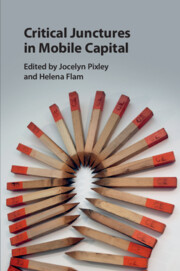Book contents
- Critical Junctures in Mobile Capital
- Critical Junctures in Mobile Capital
- Copyright page
- Dedication
- Contents
- Figures
- Tables
- Contributors
- Acknowledgements
- Introduction
- 1 Sovereign Nations and the Governance of International Finance
- 2 Coping with the Dangerous Component of Capital Flows and Asia’s Ineffective Cooperation
- 3 How Mobile Capital Plays Off Democracy
- 4 Mobile Capital as the Ultimate Form of War Finance
- 5 Capital Moves Financially
- 6 International Money after the Crisis
- 7 Beware of Financialization!
- 8 Lagoon Immobility
- 9 Impacts of Mobile Capital’s ‘Convenient Reverse Logic’
- 10 Imagine
- 11 Money, State and Capital
- 12 Superdiversity, Exploitation and Migrant Workers
- 13 The Bitcoin or the Reality of a Waking Dream
- 14 Capital Mobility and the Fragmentation of Monetary Sovereignty
- 15 Complementary Currencies as Weapons in Times of Financial Instability
- Index
- References
9 - Impacts of Mobile Capital’s ‘Convenient Reverse Logic’
Published online by Cambridge University Press: 26 February 2018
- Critical Junctures in Mobile Capital
- Critical Junctures in Mobile Capital
- Copyright page
- Dedication
- Contents
- Figures
- Tables
- Contributors
- Acknowledgements
- Introduction
- 1 Sovereign Nations and the Governance of International Finance
- 2 Coping with the Dangerous Component of Capital Flows and Asia’s Ineffective Cooperation
- 3 How Mobile Capital Plays Off Democracy
- 4 Mobile Capital as the Ultimate Form of War Finance
- 5 Capital Moves Financially
- 6 International Money after the Crisis
- 7 Beware of Financialization!
- 8 Lagoon Immobility
- 9 Impacts of Mobile Capital’s ‘Convenient Reverse Logic’
- 10 Imagine
- 11 Money, State and Capital
- 12 Superdiversity, Exploitation and Migrant Workers
- 13 The Bitcoin or the Reality of a Waking Dream
- 14 Capital Mobility and the Fragmentation of Monetary Sovereignty
- 15 Complementary Currencies as Weapons in Times of Financial Instability
- Index
- References
Summary
- Type
- Chapter
- Information
- Critical Junctures in Mobile Capital , pp. 200 - 217Publisher: Cambridge University PressPrint publication year: 2018



